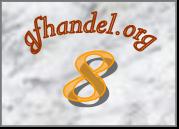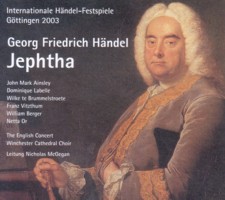If Jephtha is to be truly dramatic, its first half must reek of
morally and spiritually nauseating hubris, for only then can Jephtha’s
fall convince and the chorus’s cry of “Whatever is is Right”, an
implacable statement of eighteenth-century Christian Stoicism, provide
its stark lesson on the nature of suffering. So, is this recording one
that takes us nearer to the heart of Morell’s and Handel’s stern
intentions than earlier recordings? In the main, it is. The liner notes
by Dorothea Schröder interestingly investigates the theology of the
libretto, though I think she misreads Jephtha’s character: he is no
“virtuous and courageous soldier”, but a braggart who insists that Zebul
agree to his continued command after victory and who then presumes to
set God his own conditions. It is Jephtha’s false understanding of the
will of God which propels the story, and that this does not come across
strongly enough is a key blemish in an otherwise fine performance by
Nicholas McGegan and his musicians.
Recorded over two performances in Göttingen’s cavernous concert hall (I
recommend listening on headphones), the mainly authentic sounds of the
orchestra are enlived by obbligato coughing. Modern recording techniques
mean that the few string players of the English Concert seem greater in
number, and, similarly, Winchester’s cathedral choir is made to sound
full and vigorous. Disappointingly, William Berg’s Zebul is half-hearted
in his crucial first recitative, more like a kindly vicar wringing his
hands than a decisive spokesman. His first air, ‘Pour forth’, is much
more credible. John Mark Ainsley’s Jephtha lacks heft, though many
difficult phrases are navigated with great facility. His recitatives are
generally more characterful than his airs, which is no great fault here.
On the other hand, whoever sings Storgè must dominate Jephtha when he’s
in a domestic setting, and Wilke te Brummelstroete duly strives. She,
too, is light-voiced, but this helpfully avoids making her a complete
harridan. She expertly brings out the duality of Storgè’s character—her
name in Greek means an unstable combination of she-wolf and tender
matron. Franz Vitzthum sings sweetly, but why-oh-why does he have to
contend in his passionate pantings with an organ continuo? As Iphis,
Dominic Labelle avoids saccharine simplicity, instead projecting
religious devotion and, yes, sexy womanhood. This is the strongest Iphis
I have heard; there’s none of the over-precious brittleness of other
singers as Jephtha’s daughter.
The first Part’s initial chorus is rollickingly done, as the Jews reject
their pagan ways, though the interpolated drums create an incongruous
martial atmosphere. Throughout the oratorio Winchester’s cathedral choir
add spontaneity and sure-footed entries—the treble line has a welcome
strident rawness. They are at their best in the meteorological and
hydrological choruses, riding storms and angry waves. The orchestral
accompaniment is regularly appealing, notably in the furious passages.
McGegan’s pacing of the drama is as masterly as ever, and though his
andante seems faster than his allegro, his accurate judgment impels the
drama.
Zebul’s Part 2 air is cut, with no great loss, though the decision to add
an organ continuo to Iphis’s ‘Tune the soft’ (and her later airs in Part
2) must have been suggested by her reference to “the Holy Choir”, not
Handel; the organ oozes an odour of sanctity when the context is
something more akin to human vulnerability. Ainsley’s and McGegan’s
representation of Jephtha as an old campaigner recounting his deeds of
derring-do in ‘His mighty Arm’ are entirely persuasive. Here at last the
animated, vacuous and self-regarding Jephtha is set up for a crashing
fall. The boys make their section of Iphis’s ‘Welcome’ air attractively
jingoistic, but why does Ainsley throw away the telling phrase “and she
dies”? The quartet is finely performed by all concerned. The final two
items of Part 2 are dramatically undercharged, but sound beautiful
nonetheless.
In Part 3 the organ muddies Ainsley’s excellent singing of ‘Hide thou’.
‘Waft her, Angels’ is of course Part 3’s highlight; it never palls, and
Ainsley and the English Concert dispatch it wonderfully. Labelle’s
‘Farewell’ air aches with a candour which is truthful to situation and
music, as does the chorus ‘Doubtful Fear’, perplexed by God’s purpose.
The succession of airs towards the end of Part 3 is compellingly done.
Iphis’s leave-taking quintet is duly valedictory in tone; yet when the
final chorus sings of being “Freed from War’s destructive Sword”, it
should not have to vie with drums, which contradict the verbal text (and
composer).
Here, then, is a recording with some weaknesses. It retains, however, many
endearing qualities which I remember affectionately from the live
performance—not least the absence of frequent over-the-top ornamentation
and the manner in which McGegan observes Handel’s unique sense of how to
pace a drama over three hours or more. The ‘Farewell’ air, ‘Cherub and
Seraphim’ chorus, and the muscular orchestral accompaniment to ‘Up the
dreadful Steep’ and ‘His mighty Arm’ (to choose but two of many
examples) are worth anyone’s money.


